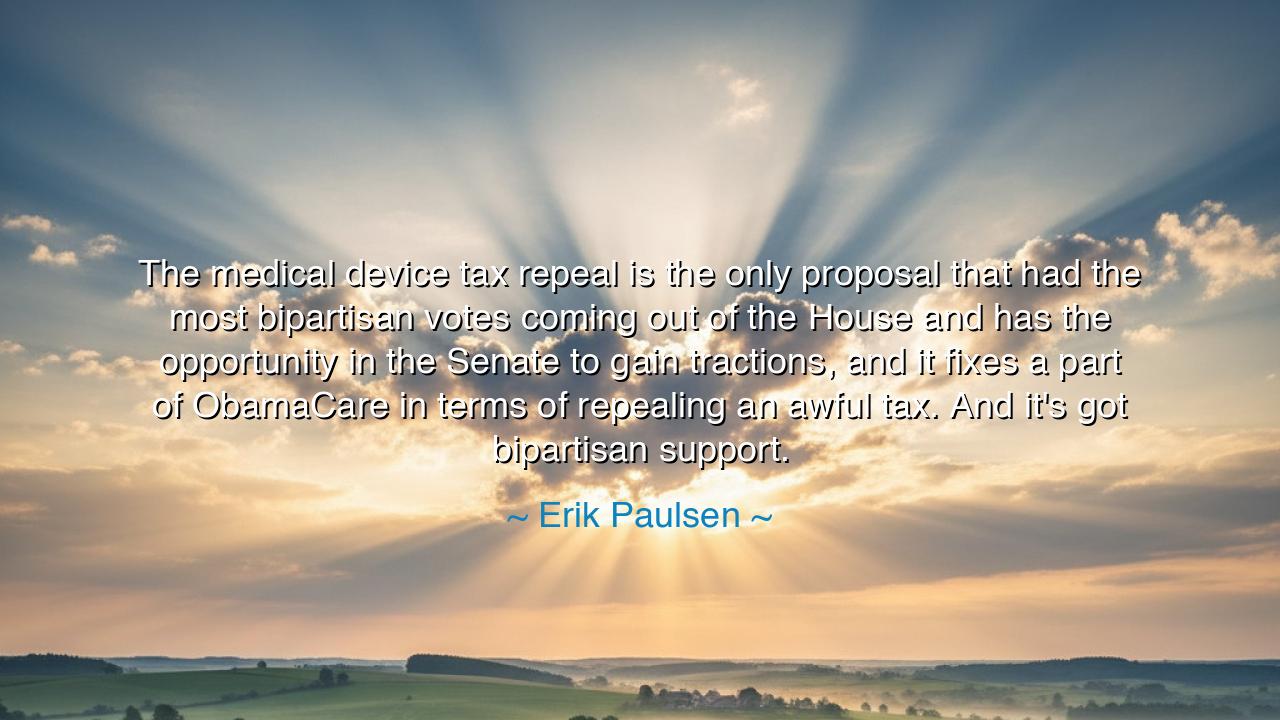
The medical device tax repeal is the only proposal that had the
The medical device tax repeal is the only proposal that had the most bipartisan votes coming out of the House and has the opportunity in the Senate to gain tractions, and it fixes a part of ObamaCare in terms of repealing an awful tax. And it's got bipartisan support.






The words of Erik Paulsen resound with the language of governance and struggle: “The medical device tax repeal is the only proposal that had the most bipartisan votes coming out of the House and has the opportunity in the Senate to gain tractions, and it fixes a part of ObamaCare in terms of repealing an awful tax. And it’s got bipartisan support.” Though wrapped in the context of modern politics, his words touch an eternal theme: the difficulty and rarity of unity. In a realm often divided by faction, where partisanship sharpens like a sword, he points to a moment where opposing sides find common cause, where bipartisan support becomes the rare flower growing in a field of division.
At the heart of his declaration lies the tension between policy and principle. The medical device tax, crafted as part of a sweeping reform, was seen by many as a burden upon innovation, discouraging inventors and healers from bringing forth the instruments that preserve and extend life. Paulsen’s words reflect the cry not only of politicians but of craftsmen, physicians, and those whose livelihoods depend on the tools of healing. Thus, his plea is not only fiscal but moral: to lift a weight from the shoulders of those who labor to ease suffering.
The ancients knew well that taxation could become either the lifeblood of a nation or the chains of its people. When Rome levied excessive taxes upon its provinces, resentment grew, rebellion spread, and loyalty withered. Yet when rulers governed with moderation, the people flourished and supported their state with pride. In Paulsen’s words, we hear echoes of this eternal truth—that an awful tax, when it strangles creation rather than nourishes the common good, becomes a stumbling block to progress.
History offers us the tale of Alexander Hamilton in the early days of the American republic. He too sought taxes, but taxes shaped with wisdom, designed to strengthen the young nation without crushing its citizens. Yet even his policies met fierce resistance, for the balance between funding the state and respecting the labor of the people is one of the oldest struggles of governance. Paulsen’s focus on repeal recalls this timeless dance: to take away what hinders while preserving what sustains.
But most striking is his invocation of bipartisan support. In our age, as in ages past, factions often battle with such ferocity that they forget the higher good of the people they serve. Yet here, Paulsen points to a rare moment of convergence, where both sides, often opposed in ideology, agree upon a single course. Such unity is precious, for it demonstrates that despite clashing banners, truth and justice may still draw adversaries together. From Athens to Westminster to Washington, history shows that societies thrive not when one faction triumphs utterly, but when adversaries find common cause in what is just.
The lesson, then, is clear: seek unity where you can find it, even in small victories. For when adversaries join together, even in a single cause, they remind the people that governance is not only about power but about service. And though progress may be piecemeal, each act of shared purpose becomes a stone in the foundation of trust, proving that enemies can still act as allies when truth compels them.
And so, what must we do in our own lives? We must not despise small agreements, nor scorn compromises that uplift the common good. In our households, our workplaces, our communities, there will always be division of thought and conflict of desire. But if we can, like Paulsen’s House and Senate, find even one place to stand together, we build the path toward peace. The wise do not wait for perfect agreement—they seize the ground where common truth is found, and from there, they build.
Thus, the words of Erik Paulsen stand as more than a political statement. They are a reminder that taxes, policies, and laws are but the vessels through which the greater battle is waged: the battle for respect, unity, and the balance between necessity and justice. Let all who hear take heed: when division threatens to consume, search diligently for the place of bipartisan support—for in that place lies the seed of harmony, and from that seed may grow the tree of progress.






AAdministratorAdministrator
Welcome, honored guests. Please leave a comment, we will respond soon